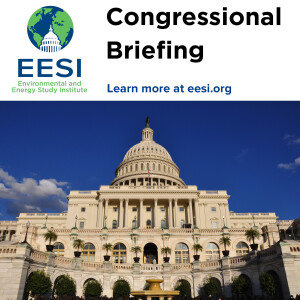
Decommissioning: A New Era in the U.S. Nuclear Power Industry; a Critical Need for Congressional Oversight
 2019-05-13
2019-05-13
Please RSVP to expedite check-in
A live webcast will be streamed at 2:00 PM EDT at www.eesi.org/livecast (wireless connection permitting)
The Environmental and Energy Study Institute (EESI) invites you to a briefing on the new era of the U.S. nuclear power industry as its electricity generation winds down and decommissioning of nuclear power plants ramps up. Decommissioning is the process of dismantling a closed plant, securing or removing its radioactive waste, and lowering a site’s residual radioactivity. Getting it right is critical to communities’ health and safety. Getting it wrong could pose existential threats.
The U.S. civilian nuclear fleet is aging out. As civilian reactors approach the end of their operating lives, their economics have been undercut by less expensive natural gas-fired generation. Even though nuclear owners are demanding state subsidies to keep some aging plants open a while longer, it will not stop the coming wave of closures. Six reactors have shut down since 2013. Another 15 are slated to close by 2025. Most of the civilian reactor fleet will inevitably close over the next 20 years.
As plants close, previously profitable assets become liabilities owners are eager to offload. Enabled by recent legislative and regulatory changes, private companies (chiefly Holtec International’s joint venture with the Canadian firm SNC-Lavalin and NorthStar’s joint venture with French subsidiary Orano, formerly Areva) are stepping in to acquire the plants, taking over their licenses, liability, decommissioning funds and waste contracts. Their business model is to decommission as quickly and inexpensively as possible, claiming any remaining decommissioning funds as profit. Economic incentives encourage them to pack highly radioactive spent fuel into thin-walled dry storage canisters not designed for the decades or centuries of storage that may be needed. Absent a geologic repository, the companies plan to ship high-level nuclear waste to Consolidated Interim Storage (CIS) sites – one owned by Orano in Texas and another by Holtec in New Mexico.
There is currently little opportunity for meaningful input from citizens, municipalities or states into the companies’ decisions on decommissioning, nuclear waste, or use of ratepayer-financed decommissioning funds. Yet more than 80 reactor communities and communities near waste storage sites, plus countless communities along proposed radioactive waste transport routes (which traverse 75 percent of Congressional districts), will be profoundly affected by those decisions.
Waste transport, CIS and the emerging privatized model of decommissioning and waste stewardship raise dilemmas and potential safety threats that have yet to be solved, or in some cases adequately studied. Even so, Congress will be called upon this year to decide on legislation and appropriations regarding CIS, Yucca Mountain and other key issues related to decommissioning. Congress has the power to require studies and stronger oversight of decommissioning.
To explore these issues, distinguished experts including regulators, independent scientists, NGO advocates, and representatives of affected communities, will speak and answer questions at the briefing.
view more
More Episodes
Methane Mitigation on the Global Stage
 2024-10-29
2024-10-29
 48
48
 2024-10-29
2024-10-29
 48
48
What’s on the Table for the Negotiations
 2024-10-24
2024-10-24
 84
84
 2024-10-24
2024-10-24
 84
84
The Mississippi River
 2024-10-14
2024-10-14
 83
83
 2024-10-14
2024-10-14
 83
83
Exploring the Policy Landscape of Carbon Dioxide Removal
 2024-09-19
2024-09-19
 98
98
 2024-09-19
2024-09-19
 98
98
Maximizing the Impact of Natural Climate Solutions
 2024-06-12
2024-06-12
 141
141
 2024-06-12
2024-06-12
 141
141
Cities Leading the Way on Nature-Based Solutions
 2024-05-24
2024-05-24
 95
95
 2024-05-24
2024-05-24
 95
95
Demystifying Ocean Carbon Dioxide Removal
 2024-04-17
2024-04-17
 97
97
 2024-04-17
2024-04-17
 97
97
The National Security – Climate Adaptation Nexus
 2024-04-08
2024-04-08
 84
84
 2024-04-08
2024-04-08
 84
84
031424ira_audio
 2024-03-25
2024-03-25
 93
93
 2024-03-25
2024-03-25
 93
93
032124factbook_audio
 2024-03-25
2024-03-25
 64
64
 2024-03-25
2024-03-25
 64
64
Understanding the Budget and Appropriations Process
 2024-03-05
2024-03-05
 107
107
 2024-03-05
2024-03-05
 107
107
Energy Earthshots: The Frontier of Climate Innovation
 2024-02-01
2024-02-01
 103
103
 2024-02-01
2024-02-01
 103
103
Unpacking the Fifth National Climate Assessment
 2024-01-18
2024-01-18
 38
38
 2024-01-18
2024-01-18
 38
38
The First Global Stocktake
 2023-11-27
2023-11-27
 2023-11-27
2023-11-27
What’s on the Table for the Negotiations?
 2023-11-07
2023-11-07
 23
23
 2023-11-07
2023-11-07
 23
23
Congress and International Climate Finance
 2023-10-26
2023-10-26
 23
23
 2023-10-26
2023-10-26
 23
23
012345678910111213141516171819
Create your
podcast in
minutes
- Full-featured podcast site
- Unlimited storage and bandwidth
- Comprehensive podcast stats
- Distribute to Apple Podcasts, Spotify, and more
- Make money with your podcast
It is Free
- Privacy Policy
- Cookie Policy
- Terms of Use
- Consent Preferences
- Copyright © 2015-2024 Podbean.com




